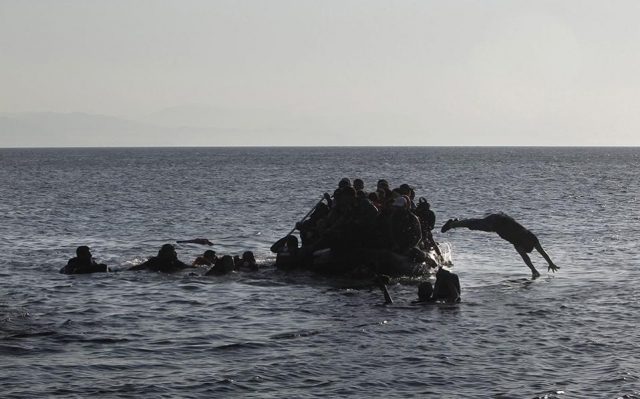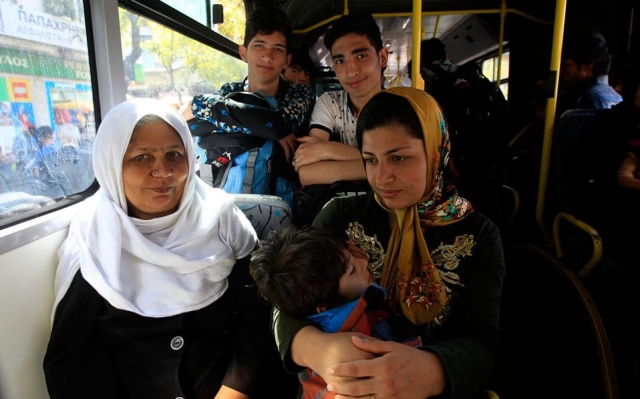Photo collage - ethnos.gr
The European Commission has developed a plan to manage migration and refugee waves, which provides for joint maritime patrols involving Greek and Turkish coast guard ships in the eastern Aegean Sea under the aegis and coordination of Frontex. At the same time, Turkey will receive funding to keep the refugees on its territory until they can be transported to Europe in a safe manner.
The preliminary version of the plan that has been disseminated by the German newspaper Frankfurter Allgemeine Zeitung seems to have the support of German Chancellor Angela Merkel and French President Francois Hollande. It stipulates that the Turkish government will have to secure the border with Greece, as the coast guard in Turkey stopped only 50,000 of the 350,000 migrants and refugees who crossed the Aegean Sea last summer.
The German newspaper notes that border control in the eastern Aegean is a complex task, and Greece and Turkey will have to cooperate in guarding the 100-kilometre border with water vessels of the coast guard services. The migrants they capture will return to Turkey, where six new refugee camps with a capacity of two million people will be built with EU co-financing.
The European Commission is planning to allocate 250 million from its budget for this purpose. The member states in turn will have to receive on their territories up to 500,000 people, so that they can reach Europe by sea, safely and without the help of smugglers.
Today Turkish President Recep Tayyip Erdoğan is in Brussels, where he will discuss the European plan at a working dinner with European Commission President Jean-Claude Juncker and President of the European Parliament Martin Schulz. In return for the cooperation, they will offer Ankara gradual relief in the granting of a European visa for Turkish citizens.
Tackling the migration and refugee waves is the leading issue of the visits to Athens of two other European representatives. Tomorrow Austrian Chancellor Werner Faymann will meet with Greek Prime Minister Alexis Tsipras on Lesbos, where at least 100,000 refugees and migrants have arrived since the beginning of the summer. They will visit the reception and identification facilities for new arrivals and will discuss the further cooperation between their countries in solving the pressing problem across Europe.
The assistance to be rendered to Greece to cope with the refugee influx is the main topic of discussions during today’s visit to Athens of director of the Structural Reform Support Service Maarten Verwey.

Photo: kathimerini.gr
According to the Greek news portal seleo.gr, the guarding agency of Europe's borders Frontex is looking to recruit 775 additional employees, which is the largest number announced since its establishment.
The aim is for the additional staff to help Greece and Italy deal with the listing and identification of migrants arriving from Libya and Turkey. 670 of them will be in charge of inspections, provision of psychological support and translation, and another 105 will be charged with guarding the external EU borders.
The edition states that those employees who are engaged in separating migrants into groups will help the local authorities to determine the nationality of migrants and to put them on lists whereas the psychological support group has to collect data about the actions of smugglers.
Meanwhile, the inhabitants of Greek islands have once again faced the tragic consequences of the risky crossing of the sea in inappropriate boats. Over the past weekend, four badly decomposed bodies of migrants, two of whom young children, were found on the shores of the island of Kos. In particular, one of the children was apparently a baby aged 6 months to 1 year, and the second between 3 and 5 years. The third body belonged to a man aged 40-45 years.
His body and that of a woman aged about 64 years were found wrapped in orange lifebelts. The woman’s body was found in the same maritime region, where the bodies of the baby and the child were discovered. The victims have not yet been identified nor have they been recognized by the migrants on the island.
It is worth noting that between Friday and Monday morning the Greek coast guard rescued at sea 1,743 illegal immigrants during 57 rescue operations in the eastern part of the Aegean Sea.
The disasters were detected on the high seas off the islands of Lesbos, Samos, Farmakonisi, Kos and Megisti. This morning, 1,173 illegal migrants arrived in Piraeus, who had been transported from Lesbos by the Ariadne ferry.

Photo: kathimerini.gr
In view of the fact that the majority of them set off to Victoria Square in the centre of Athens when they arrive, the Greek Ministry for Migration has decided to send public transport buses to transport them to the two temporary reception centres in the suburbs of Galatsi and Eliniko whenever necessary.
The measure has been imposed because of the recent problem that, having been notified by the police that they cannot stay in Victoria Square, many migrants had headed to the nearby Pedion tou Areos park to pitch their tents there.
From now on, every time there is a strong presence of migrants in these two places, public transport buses will transport them to the two centres. According to the Secretary of the Ministry for Migration, about 400 immigrants were transported on Sunday and Monday.